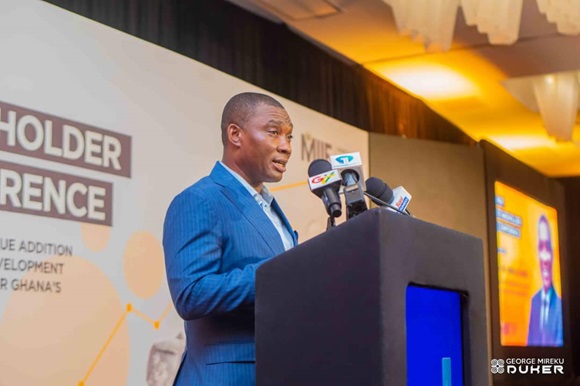The Deputy Minister for Lands and Natural Resources, Hon. George Mireku Duker, MP, has tasked the management of the Minerals Income Investment Fund (MIIF) to partner with the National Security Ministry, Lands, and Finance Ministries to develop a strong system that will help track and curtail the gold-smuggling challenge.
The Deputy Minister, who is a former Board Chairman of MIIF, wants the Fund to collaborate effectively with other institutions to curb issues of illicit transportation of gold and other minerals from the country.
He indicated that the trend where a chunk of the country’s precious minerals leaves the shores of the country unchecked affects the economy and hence cannot be allowed to fester.Speaking at the Second MIIF Stakeholders’ Forum on Tuesday, October 15, in Accra, the Deputy Minister charged the Fund to prioritize working with the aforementioned ministries to combat this menace and sanitize the mining sector.
It is estimated that Ghana loses approximately US$2 billion annually in tax revenue due to smuggling and illegal gold operations.
In 2022 alone, it is reported that nearly 60 tonnes of gold were smuggled out of the shores of Ghana.The worrying development, many believe, could encourage the illegal mining menace, popularly known as galamsey, if left unchecked and could deny the state the needed revenue
Value Addition
Shedding light on the importance of MIIF, Hon. Mireku Duker, who acknowledged the massive investments MIIF undertook within six years of its existence, further challenged the Fund to look at the value addition avenues in the current mining space and provide the necessary support for economically viable options.
Emphasizing the important role of value addition to the realization of the full benefits from Ghana's mineral resources, Hon. Duker stated that value addition is the missing link between resource-rich countries and developed nations.He said often, countries that benefit immensely from these minerals are those that do not even possess these minerals but are endowed with the necessary technologies to refine these minerals into valuable products.
“The absence of or limited access to technology in most of the mineral-rich countries has meant that the minerals are only exploited and exported to other jurisdictions which are more technologically endowed and therefore have a comparative advantage in that respect. Indeed, sometimes some of these countries with the technology to add the value have virtually no mineral endowment at all,” the Deputy Minister explained.
He also mentioned some of the steps the government has taken to add value to its resources, explaining that these are channels through which Ghana is working to maximize the value chains of its minerals to the extent possible.
Among them, he indicated, are the establishment of statutory agencies like the Ghana Integrated Aluminium Development Corporation (GIADEC) and Ghana Integrated Iron and Steel Development Corporation (GIISDEC), facilitating the integrated development of the value chain for bauxite-alumina-aluminium and iron-and-steel, respectively.
He also highlighted the recently commissioned Royal Gold Ghana Refinery, in which Ghana holds a 20 percent stake, with the vision to help process gold ore produced in Ghana before exports.Hon. Duker also mentioned specifically MIIF’s investment in the Ada Songhor Salt project by Electrochem Ghana Limited as great moves that will yield results for the country.
“I am proud of the investments done so far, more especially the collaboration with a very enviable company that is fostering the Songhor salt, and I know it will be one of the best investment groups,” he said.
He further urged the Fund to partner with the Ghana Geological Survey to establish a mineral exploration fund and accelerate the development of the mining value chain through the development of mining communities by establishing downstream value-addition industries.
“I trust we would all pitch in to support these initiatives, which are meant to move us from what has been described as the colonial legacy to a more proactive approach to our developmental agenda.”
Speaking under the theme “Minerals Value Addition and Value Chain Development - Essential Tools for Ghana’s Development,” Chief Executive Officer (CEO) of MIIF, Edward Nana Yaw Koranteng, in his welcome address, said his outfit is leveraging technologies to expand the royalty base of MIIF.
Mr. Koranteng disclosed that they are working to ensure that in the next 10 years, their royalty base will grow to US$6 billion.“Looking at that growth and the fact that we are expanding the royalties and we are seeing more money come into play, we are seeing more minerals come into play, especially the critical mineral side, the graphite come into play and all that.
"We are also using technologies to expand our royalty base, so looking at that and the fact that we have been able to grow our royalties on these angles, we anticipate that within 10 years’ time, we should be more than US$6 billion. In-house, even though we have announced US$6 billion, we are actually going with $10 billion.”





